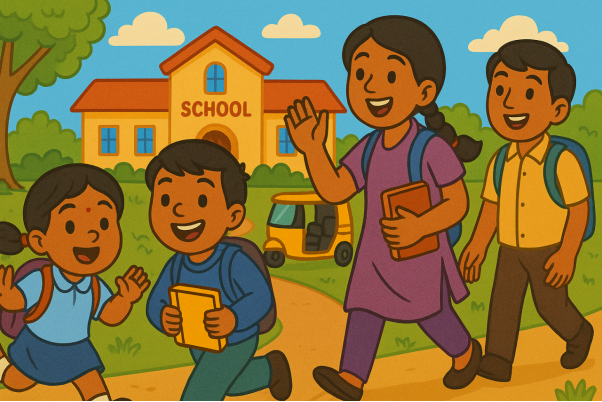Ask any early childhood expert when the most critical phase of human development occurs, and you’ll get a unanimous answer: the first five years. These early years shape not only how a child learns, but also who they become.
While some parents still assume that “real learning” begins in primary school, research continues to prove otherwise. The brain develops faster from birth to age five than at any other time in life. And the experiences children have during this period—at home, in daycare, or at preschool—form the foundation for everything that follows.
Preschools like Beansprouts Pre‑Primary in Gurugram are redefining how families approach early learning, not just by preparing children academically, but by nurturing their social, emotional, and cognitive growth during this vital window.
Brain Growth is Fast — and Permanent
By age five, a child’s brain reaches nearly 90% of its adult size. During these years, billions of neural connections are being formed at a pace never seen again in life. This means that children are not just learning—they’re absorbing.
Language, empathy, problem-solving, and motor skills are all developed through everyday interactions. The quality of those experiences—what they see, hear, touch, and feel—matters deeply. That’s why environments that are nurturing, engaging, and responsive make such a lasting difference.
At Beansprouts, this understanding is central to how the curriculum and classroom experiences are designed. It’s not about pushing academics early—it’s about supporting each child’s natural curiosity and development in meaningful ways.
Early Experiences Shape Emotional Security
Beyond brain science, the emotional landscape of a child is formed in these early years. How a child is responded to—whether they feel safe, understood, and respected—impacts how they manage emotions, build relationships, and handle challenges later in life.
Preschools that emphasise emotional literacy, positive reinforcement, and social interaction help children develop confidence and self-regulation. These are the real “school readiness” skills that lead to long-term academic and personal success.
Beansprouts takes this seriously. The focus isn’t only on what a child knows, but on how they feel. Children are encouraged to express themselves, ask questions, and navigate relationships with support, not fear.
It’s Not About Early Academics—It’s About Early Foundations
Parents sometimes worry that a preschool might be too “soft” or that their child won’t be “ready” for Grade 1. But in reality, the best preschool experiences don’t just teach content—they build the capacity to learn.
Children at Beansprouts are introduced to early literacy, numeracy, and world knowledge through stories, games, art, and exploration. They’re not just memorising—they’re connecting ideas, developing language, and building attention.
When higher academics begin in later years, these children are not only ready—they’re eager.
Social Skills Begin Early, Too
The ability to share, take turns, listen, and collaborate doesn’t emerge automatically. It’s modelled, practised, and reinforced—starting in early childhood. Preschools that provide group learning experiences, guided peer play, and socio-emotional discussions give children the tools to succeed in social settings.
This is especially important in a fast-paced city like Gurugram, where nuclear families and busy schedules may limit daily peer interaction. A setting like Beansprouts offers children safe, joyful social exposure that’s hard to replicate at home.
Final Thoughts
The first five years aren’t just preparation for “real” school—they are school. They are the years when habits, mindsets, and relationships with learning are formed.
By choosing the right preschool, families are not just securing early childcare—they’re investing in a child’s lifelong journey of growth. And schools like Beansprouts Pre‑Primary understand this deeply, offering environments where young children don’t just learn—they thrive.
Because when it comes to early childhood, every moment matters—and the right start makes all the difference.


